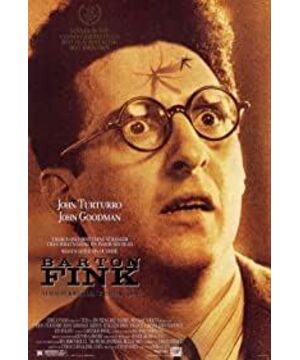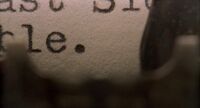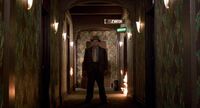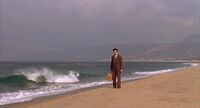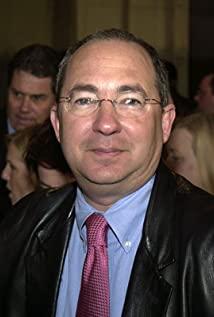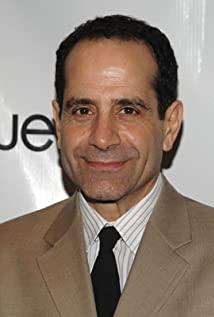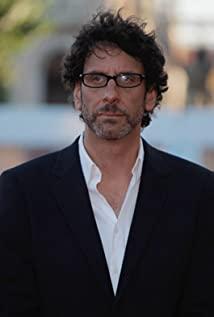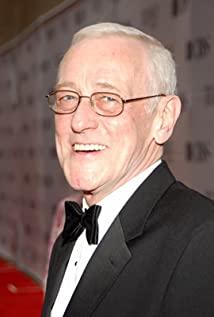I came from "Serious Men" to "Barton Funk". I first heard that the show was brain-burning and aroused curiosity. After watching it, it was really brain-burning. I watched it at least 10 times+. Time should be wasted on beautiful things, so much time must be left behind, so I would like to leave this article as a souvenir and record my own humble opinion.
The story of the movie is actually very simple. A well-known Broadway playwright came to Hollywood to create a new world, but instead of experiencing the joy of Hollywood heaven, he experienced pain like hell. The surreal style of the film is very obvious, and the Coen brothers are too good at creating this kind of real and fantasy feeling. Everything seems to be ambiguous and cannot be concluded with certainty.
After analyzing the key scenes and lines, I tried to analyze the plot, but I think the attitude and philosophy really conveyed by the movie are what should be paid more attention to, but this part of the benevolent sees the benevolent and the wise sees the wisdom, so I won't go into more details.
1. Patton's real experiences and fantasies
Let’s start with the conclusion, and sort out the reality and illusion of the main scenes:
1. The theatrical performance was successful, and Garland communicated with Garland about the development of Hollywood at the celebration (real)
2. Arrive at the Earl Hotel in Los Angeles, check in at Chet (real)
3. Meeting studio owner Jack Lipnick for the first time (real)
4. First meet and talk with neighbor Charlie Meadows (fantasy)
5. Meeting director Ben Geisler for the first time (real)
6. Met the idol Bill Mayhew and agreed to visit in the afternoon (real)
7. Visit Bill in the afternoon to meet his secretary and lover Audrey (true)
8. Second conversation with Charlie at the hotel (fantasy)
9. Party with idol Bill and secretary Audrey (real)
10. The third conversation between the hotel and Charlie (fantasy)
11. Second visit to director Geisler to watch wrestling samples (real)
12. Ask Audrey for help at midnight and have sex (true)
13. Shoot the dead mosquito and find Audrey's bizarre death, ask Charlie for help - the fourth conversation (fantasy)
14. 8:15 second meeting with the boss Lipnick (real)
15. Back to the hotel Charlie said goodbye and handed over the box - the fifth conversation (fantasy)
16. Two police detectives follow up and question (fantasy)
17. Go back to the room, Wen Siquan, start writing the script and complete it (fantasy)
18. Dancing orgy, celebrating the completion of a good work (real)
19. Back to the hotel, the detective asked for the second time, Charlie returned to kill the detective, the sixth conversation (fantasy)
20. Meeting the Boss Lipnick for the third time (fantasy)
21. The beach meets the picturesque beauty (fantasy)
First look at Charlie. From the previous appearances, it is actually difficult to judge whether he exists in real reality or is fantasized by Barton. But from Charlie's last magical appearance, setting off the entire hotel with hellfire, and killing two detectives, it is obvious that he is an unreal existence. Charlie, as Barton's fantasy character, can actually be seen in many conversations. At the end of the first conversation, Charlie said "Too much revelry late at night, you forget there's other people in the world." The subtitle translation of this sentence is "Too much revelry late at night, you forget there's other people in the world." But what's interesting is that in addition to the meaning of carnival, revelry also has a fantasy meaning, suggesting that these are fantasies. In addition, every time Charlie appeared, it was amazingly in line with Patton's mood and needs at the time, and it was tailor-made. It was the first time that Barton met his boss during the day and learned about the next task he was going to complete. Charlie appeared at the beginning of the script. Barton had just arrived in Hollywood, and there was no one around to chat, and he was extremely lonely. Charlie It happened to appear, and it was the main object of Barton's creative services - the general public. The two of them mainly talked about the topic of work. Apart from the opening chapter, this was the second time that Barton emphasized and affirmed his creative philosophy; Charlie's second appearance was After Barton heard the sound of the bed next door, the main topic of the conversation between the two was sex, and they were in close contact. Charlie's expressions and lines when he wanted to demonstrate to Barton wrestling were very intriguing. Charlie's third appearance is after Barton's party with idol and secretary broke up unhappily, Charlie happened to complain that he was rejected and ridiculed for selling insurance, and had a dispute with the doctor, and Barton also had some disputes with idol Bill. with unpleasantness. Charlie's fourth appearance is when Barton was terrified to find that Audrey, who had been in love with him, was dead on his bed, and Charlie actually trusted Barton unconditionally and helped deal with the corpse. Charlie's fifth appearance is when Barton meets his boss, and the scriptwriting is in a stagnant but urgent situation. Charlie happens to give Barton a box that inspires his creative inspiration. And the sixth time was when the detective discovered that Patton was related to the victim, Patton was talking about Charlie and he appeared immediately, like an American Cao Cao, and rescued Patton.
The film takes the 13th classic plot as the main demarcation point. Except for the plot in which Charlie appears in the first half, the rest are basically real, and after that, it is basically fantasy. Mosquitoes play a crucial role in distinguishing reality from fantasy. Before shooting the mosquitoes to death, Barton heard the mosquitoes call three times, and when he saw the boss and the director, there were also bites on their faces, so it was obviously real. When the real mosquito appeared, Barton's eyes and the mosquito's blood sucking happened to have close-ups, as if using a microscope to zoom in on the mosquito, the movements of the mosquito and the skin of the human body were very clear, which in itself was surreal enough. It's real to hear its sound, but it's a fantasy to see its shape, which is very interesting.
Most of the plots after shooting mosquitoes are fantasy, but they are mixed with several real scenes, which makes many plots difficult to distinguish. The following will explain them one by one.
The first thing that needs to be judged is whether Audrey has attended the appointment and whether he has died. This is where the important props wallpaper and tacks come into play. The first time the wallpaper comes off is after Charlie leaves the room for the initial conversation, which is real, Chet, the hotel attendant behind, provides the tacks, which Button uses, and the camera scans the tacks on the table before Audrey arrives. After Audrey arrived, he noticed that the wallpaper on the right side of the door did not fall off when he entered the door. Before that, the wallpaper at this position had fallen off, when Barton and Charlie had the third conversation (actually it was an illusion), so in reality The wallpaper in this location has not fallen off, so when Audrey came to the appointment, the wallpaper here also hadn't fallen off.
And when Barton wakes up and finds Audrey dead, notice that the wallpaper at this location is back to falling off, because Barton has fallen into a fantasy state again.
Since Audrey's death is a fantasy state, and Charlie is also fantasizing, it can be inferred that the box that Charlie handed over to Barton (the audience including Barton thought it was Audrey's head) does not exist at all, so any scene where the box appears later is All of them are in a fantasy state, and focus on it. This is an important basis for judgment.
After the mosquito shoot, only two key scenes of meeting the boss and the dance party are real (there is also a small unobtrusive scene, which will be explained later).
The props that appear repeatedly in the film all have specific meanings. There are basically no redundant shots in the film, and the shooting angles are also very elegant. The content captured by the shots has its purpose. I really admire Cohen. Brothers (there are too many examples, just give one, you can see the difference in the placement of items on the washbasin before and after Barton was groggy in the bathroom after the murder). In the film, Patton looked at the watch twice (here refers to the close-up of the watch, and the conversation with Audrey does not count), the first time was after 12:30 in the evening, when Patton was at a loss and called Audrey for help, the watch triggered the following incident. The real scene, and then the panic broke out for the first time after Huan Ai. The second time was when Barton, who was drowsy in the fantasy, glanced at his watch in the bathroom. It was exactly one minute to eight o'clock, and he agreed to report at the boss's house at 15 minutes. The watch triggered the real scene of meeting the boss. The second meeting with the boss aggravated Barton's panic, urgency, and pain, which in turn triggered a series of murderous fantasies that followed.
The scene at the dance party is also real. In fact, most of the scenes in the film that take place outside the hotel are real, except for the third meeting with the boss and the beach girl at the end. The party carnival is an important factor in promoting Patton's madness. In great agony, Patton fantasized about the best work he had done, and went out to celebrate his release. However, the reality is ironic and cruel. He pretentiously speaks for the general public, creates for the common people, points to his head and shouts "This is my uniform" (an important line), but is scolded as a lunatic and greeted mercilessly. The face was slapped and hit the ground.
Let’s talk about the inconspicuous real scene mentioned above, caught in the illusion: in the middle of the room creation, Barton once put his shoes at the door (because the hotel has a free shoe shine service), pay attention to the so-called Charlie room next door at this time There is a pair of shoes at the door, and Charlie is still on a business trip in New York at this time, which further confirms that Charlie is just a product of Barton's fantasy.
Everyone has doubts about whether Barton has written and completed the script, and many people have not even doubted its authenticity. After all, it seems to be so natural. First of all, as mentioned earlier, all the box scenes are fantasy parts. The box was placed on the table during the entire creation process of Barton, and the photo given by the fantasy character Charlie naturally did not exist. On the beach girl mural that frequently induces fantasies; secondly, let's look at the specific content of Patton's creation, which is read out by the detective: "Where is my little boy? He left in the morning. He said he had a job. There's something in it, something new. Mother: What will happen to him? Father: There will be news about the crazy wrestler. I'm not specifying postcards." Contrast the lines at the end of the play at the beginning of the film: "I Awake, for the first time in years. Uncle David said it. Days are dreams if you close your eyes. Well, my eyes are open now. . Let's sing. Goodbye, Murray. Goodbye. We'll have news about that child, I'm not pointing out the postcard." I found no, the ending of basically the same pattern, even the last sentence is the same! A good writer, two proud works, but with the same ending, think about how unlikely it is.
Another confusing and seemingly real scene in the second half is seeing the boss for the third time and being scolded in blood. I didn't doubt the authenticity of this paragraph at first, it seemed too normal and natural. In an interview at Cannes in 1991, the Coen brothers once said, "Lipnick's uniform of a colonel is one of the most surreal elements in the film." I was shocked when I saw this sentence! After burning for a long time, I finally figured out why this uniform is surreal. First of all, Patton came to see the boss with a box, so it was an illusion; secondly, remember at the USO ball earlier that Patton pointed to his head and said, "This is my uniform", in reality, he was worn by sailors and army uniforms in navy uniforms. The soldiers beat and shoved, and the concept of uniform was reinforced in his mind, so in the fantasy, the boss also put on a colonel uniform. At the ball, the sailors told Patton that they were going to sail tomorrow, and these soldiers had to go to the battlefield, so the boss in the fantasy kept mentioning the war. Finally, let me talk about why the boss in the fantasy turned out to be flattering and attentive before, and became terrifying and terrifying, and he sneered at Patton's work and completely denied it. In the bottom of his heart, Patton has always felt that he is not understood and is lonely. His works are also detached from vulgarity and low taste, so this kind of work is not easy to be accepted and recognized by Hollywood, especially compared with the garbage samples I watched before. After meeting with the boss for the second time, Barton actually saw the boss's hypocritical face (note the close-up of the boss scolding Lou "you stinky Jewish bastard, bastard", his eyes have been swiping back and forth on Barton and Lou, Then he got up and continued scolding at Lou), the director also warned Barton before, "That means he'll make your life hell, he will make you suffer." After these attitude changes, Barton is also very repulsive of the boss, with the boss's vulgar taste Of course, you can't appreciate your own work.
In the final fantasy scene, the beach meets the picturesque beauty, the Coen brothers said, "In this movie, we know the actual question of where Barton Fink is going to end up." Hollywood is heaven and hell for playwrights, Barton's trip to Hollywood Failed to the extreme, he felt lost, confused, disappointed, miserable, like he was in hell, he didn't fit in here, or his inner instinct was against it, as Charlie said, Patton was just a tourist with a typewriter, so in the end Also fantasize about going to the beach like a tourist. When he saw the beautiful woman making the exact same action as the mural in the room, Barton asked, "Are you in pictures? Are you making a movie?" This sentence can also be understood as "Are you in a painting", so the beauty's The answer was also a pun, "Don't be silly." Don't be silly.
Talk about the whole plot, and then talk about a few key points to understand the film.
What is the relationship between Charlie and Patton?Charlie is a completely split character from Barton's fantasy, and his birth is precisely because of Barton's inner needs. He is Barton's psychological projection and the externalized embodiment of Barton's psychological activities. Patton wanted to speak up for ordinary people, express their pain, and express their beauty and pursuits, so Charlie was arranged to be an insurance salesman. In the previous few conversations, the content of the two people's chats matched, which has been discussed before, and will be explained in detail or supplemented here. The first time we talked about work, Charlie called selling insurance as selling peace. Barton thought that he conveyed his dreams for ordinary people, and he was idealizing his work; the second time we talked about sex, Barton had just heard the sound of the bed in the next room. , Charlie showed him a little yellow picture of a naked girl. Barton said that he was very lonely when he couldn’t care more about women because he was busy with work. Charlie immediately relieved him that women were pretending to give and then asking for more. Barton had no sexual experience, and Charlie immediately A close contact, although the experience was not very pleasant, and afterward, I took care of Patton's mood and said "It's your first time and you're small". Talking about their troubles for the third time, Patton was scorned and humiliated by his idol Bill during the day (Your writin'? and the phrase Oh, no, son. I'm building a levee. Puttin' up a levee to keep that ragin' river of manure from lappin' at my door. It has already been implied that Barton is a river of stinky shit), Charlie came to ask for consolation and said that he was rejected for selling insurance and mocked for being fat, and Barton was also experiencing work difficulties, looking for No creative inspiration. Charlie said that the wallpaper fell off in their rooms, and felt that Barton was pitiful in such a hot environment, but in fact, Charlie was more sensitive to temperature, and Charlie's sweat was like glue running down the wall ( Most evident during the last dialogue on fire). Another message in the third conversation is that Barton said the bottleneck of his creation, and Charlie told Barton "Things have gotten all balled up at the head office.
Does Charlie's ear disease, pus have a specific meaning? Since Charlie is Patton's mental projection and his thoughts are externalized, Charlie's ear disease naturally also alludes to Patton's occlusion-hearing disorder. During the first conversation between the two, Charlie had been interested in telling stories of common people many times, but they were all interrupted by Barton. Barton only cared about his own ideals and noble feelings, and had no scruples about others at all. In the second conversation, Charlie was talking about his experience with customers in Kansas City, when he was interrupted by Patton, a ridiculous playwright who is so obnoxious and obnoxious in this regard. So in the last dialogue, Charlie directly complained "Because you don't listen!", and after shouting this sentence, the pus in the ear flowed down, just like the sticky glue on the wall.
What is the symbolic meaning of the dilapidated hotel? The hotel is not only the real space for Barton's accommodation, but also the space in his fantasy. It has the implied meaning of hell, and it is also the embodiment of Charlie's externalization. As soon as Barton stepped into the hotel, everything looked dilapidated and weird, a little abnormal. The elevator staff are old and dull, the two letters in front of the elevator lights are a bit dim, and the corridor has been accompanied by eerie and strange whistling noises, and everything has a faintly disturbing sense of horror. When checking in, the waiter Chet once said twice very naturally: "Everything seems to be in order. Everything is fine" This sentence can also be translated as "Everything seems to be normal", which is intriguing. After entering the room, this dilapidated and abnormal feeling is even stronger. The creaking bed, the hard-to-open windows, the cramped space, the only thing that is pleasing to the eye is the beach girl mural in front of the desk. It was easy to induce Barton's fantasy, and he seemed to hear the sound of waves and seagulls the first time he saw it. In the second half of the plot, we can clearly feel that being in the hotel is like being in purgatory, and as the externalized embodiment of Charlie (Charlie is the projection and externalized embodiment of Barton's psychology), when Barton is imagined by the two policemen in the fantasy When Tan forced him to question and humiliated him, he became angry, "Charlie's back. It's hot, he's back." Then the sound of the arrival of the elevator on the 6th floor sounded, the wallpaper in the corridor began to fall off, the glue kept sliding down, and the elevator came out. Fire and smoke, and after Charlie appeared, a fire started in the corridor. When Charlie ran in anger, the flames also burned, and the whole hotel was getting closer to hell.
Why fantasize about Audrey's death? This is the bizarre turning point of the whole film. The reason why he fantasizes about Audrey's death is that Barton's mentality has tended to collapse due to external work pressure and the collapse of his idol image, plus the influence of subconscious hints. Before that, the director told the boss to report the progress to the boss, and the time was very tight, but the key point was that Barton had no clue, no inspiration, he was overwhelmed, and was very anxious. The overall collapse of the idol image has intensified Barton's emotions. Before, he just thought that Bill was in pain because he couldn't create and was drinking too much. Although his drinking behavior is a bit shameless, he still thinks Bill is a great writer (in comforting Audrey and working with him) It was reflected in the director's second communication), but Audrey's unintentional disclosure really made Barton angry. Bill was just a liar who could no longer create and was looking for a shooter. This anger of his will be externalized in Charlie's behavior. The subconscious suggestion comes from two aspects. The first is that he only watched the wrestling demo in the screening room during the day, and it kept repeating the same line "I will destroy him!", which was simply magical brainwashing. The second is Audrey's suggestion. When he was talking about the usual mode of wrestling movies, he mentioned that usually good wrestlers will be treated as brutes or criminals, so this is what Barton imagined later, Charlie became a murderer, The protagonist of the script based on Charlie is also a fat, crazy wrestler. You can listen carefully to the sound accompanied by the deep sewer pipe when Patton has a relationship with Audrey. The female voice is panting and moaning, while the male voice is actually a very terrifying voice, a bit like the voice of a wrestler in the demo.
Why do you fantasize about two police detectives? Audrey's death alone is not enough to inspire Barton's creation. He has to find a criminal who is also the prototype of his creation, so someone else has to reveal Charlie's criminal identity. Charlie can't help him deal with the body, then Side blew himself up as a murderer, and Barton couldn't doubt Charlie when he was full of gratitude and trust. The two police detectives also reflect Patton's subconscious. The tall one is called Deutsch, alluding to Germany, and the short one is called Mastrionotti, alluding to Italy. It goes without saying that the Nazis persecuted Jews during World War II, so in the fantasy it was these two police officers. The detective is tracking and questioning Barton, and he is very disrespectful to Barton, so at the end Barton will definitely use Charlie's hand to destroy these two people in his fantasy.
What does the box refer to? The box actually represents pain and is also a source of inspiration for creativity. Patton has repeatedly stated that he can feel the pain of ordinary people, and his creations or great creations should also come from the pain in his heart. So Charlie said when he handed over the box, "When everything that's important to a guy, everything he wants to keep from a lifetime, and he can fit it all into a little box like that. When this thing is important to you, You want to keep it for the rest of your life, you can put it in a little box like this." So after being questioned by the detective, Patton, including the audience, thought that the box was Audrey's head, which completely inspired his pain (love himself Such a talented woman has died, and the murderer is still a close neighbor who gave him a lot of comfort and help), so he wrote like a god at once, and his thoughts flowed, and he started to create. And until the end, the hotel was engulfed in flames, but Barton only took two things, one was the script, the other was a box, not even a typewriter or other luggage (it was not too late, because he was well dressed and walked Slowly), and the box keeps going wherever it goes, because Patton wants to keep it for life. At the end of the whole film, the box has not been opened, and what is inside is not revealed, because there is no way for an empty spiritual thing to be displayed in reality. If it was a human head, the two detectives had been in Patton's room for so long, after reading the script and admiring the Beach Girl mural, it was impossible not to see the box on the table. Normally, they would open the box to see if it was true. It's not the heads, and it's not that they keep asking Patton where those heads are hidden.
Why look at the Gideon Bible? The Gideon Bible, one of the Christian Bible versions, is available in hotels and motels around the world. The episode of reading the Bible, which happened after Charlie left and before the detective questioned, was surreal and very interesting. Patton mainly saw two contents, one is the dream of the king in the book of Daniel, and the other is the beginning of Genesis. Let's start with the king's dream. The king refers to the Babylonian king Nebuchadnezzar (which happens to be the title of the book that Bill gave to Patton, so this is also a subconscious fantasy). Daniel was Israel's old priest. After Israel fell, he was taken into captivity and imprisoned in a foreign country. Nebuchadnezzar, the king of Babylon, often had nightmares in the second year of his reign, and was upset and insomnia. One day he had a strange dream, but he forgot the content of the dream, so he summoned many magicians to interpret the dream. To the Chaldeans (in the book of Daniel, "the Chaldeans" refer not only to the Babylonian nation, but also to the special class of Babylonians who used divination and star-gazing as a profession. They were also called wise men.) "I can't remember my dream. If you don't tell me my dream and its meaning, you will be torn to pieces and your place will be hell." This sentence happens to be in line with Patton's current situation, when he Waking up with no recollection of what happened, and Audrey dead and his room now just like hell, the king's dream fits Patton's mood perfectly. Looking at the content of Genesis again, Barton found that the beginning of the script he created actually appeared in the first two paragraphs of the first chapter of Genesis. It is a typical surreal. You can compare the beginning written by Barton with the beginning of Genesis here. It is roughly the same, but there are still some Nuanced, this also reflects some of the disorganization in the fantasy state. Patton's subconscious already felt that he was the omnipotent and omnipotent creator, so at the actual dance party later, he yelled at the crowd "I'm a writer . I create. I'm a creator! I'm a creator !" So the content of the Bible that Patton looked at was just the embodiment of his state of mind and subconsciousness.
Why was Bill also fantasized to death? In the fantasy, Audrey was killed by Charlie as explained earlier, but normally Charlie hides his body and runs away, there is no need to kill Bill as well, after all, they have never been in contact at all. But don't forget that Charlie is Barton's inner projection, and Charlie's actions all reflect Barton's will. Barton wanted Bill to die for two reasons. First, the idol he used to admire is now just an alcoholic, just a drunken scum, just a liar looking for a shooter, whether it's because he doesn't want to be with this kind of person, or because he gets it for Audrey. Whether it's bullying or injustice, Barton wants to destroy him. The second is the subconscious suggestion. When the three of them got together, Bill once said, "When you can't write, you can't run away from yourself, you want to throw your head away", so Barton asked Charlie to take off Bill's head and fulfill him. There is also the story of Solomon's mother that Bill once mentioned. In the Bible, Solomon's mother is called Bathsheba, a beautiful woman. She was originally the wife of Uriah, a subordinate of King David. Once David was walking on the roof When he saw Bathsheba bathing naked, he fell in love with the beautiful Bathsheba. After seducing Bathsheba and getting pregnant, David killed Bathsheba's husband Uriah. Therefore, after Patton had a relationship with Audrey, he subconsciously wanted to kill Bill like David did.
What interruptions did Patton experience in Hollywood? Mainly from the external level and the psychological level. The interference from the outside world is directly reflected in the sound from the three walls of the room. The wall on the side of the desk is a strange cry and laughter, the wall on the side of the bed is the sound of the bed, and the wall on the side of the bed is the sound of the bed. The sounds of bumping, dragging, moving and tapping, these distracting sounds came up when Barton was thinking about creating. The psychological interference mainly comes from the boss and the director. The boss seems to be very friendly to Barton, but the creative time given is very tight, and of course he also pays a high salary. The boss said on the surface that he would let Patton play by himself, but he actually limited the scope - the lady ("Let's make it a dame and keep it simple."), also said in the pool conversation, "This wrestler is very poor, he has to fight with life. ". And the director also introduced Barton into a sad situation step by step. The first time we met, the director said don't worry, a B-level film, as long as he proposed a budget, would not shoot at all, and he also told Boss Patton that he didn't take it seriously. However, in that era, Hollywood directors had no right to speak. Later, we saw that the boss quickly asked to report the general content of the story. The director directly raised the boss's expectations without knowing the progress of Patton's creation, which further strengthened the pressure on Patton. . In addition, the director once gave Barton two suggestions, but tragically, neither of these two suggestions helped, but instead accelerated Barton's collapse. The first suggestion is to chat with his peers, but unfortunately Barton encounters Bill, an alcoholic who can no longer create. The second suggestion was to watch the wrestling demo, which pushed Barton directly to the brink of a nervous breakdown.
What might be the future of Patton? Most likely "domesticated" as Bill puts it. Several aspects can be seen. First, the works created by Barton's fantasy, let's look at the main sentences, "She is a good woman..." "A young sloppy girl opened the door of the fat man's apartment" "Tell the fat man, we have to get from his Minus that in your wallet", combined with the aforementioned chubby-inspired archetype of murderer Charlie, Barton's creations follow exactly what the boss expects (women, poor wrestlers) and what Audrey tells about the film's formulaic formula. Second, when Barton checked in, there was a hotel note that featured "A day or a lifetime". Chet also asked him whether he was staying for a long time or was passing by. At that time, he said he didn't know. However, Barton didn't only stay for one day, so he even It is possible that he is here all his life. So the Coen brothers said in an interview that Patton was abused for 20 years, and he was used to it.
2. Portraits of the main characters
To sort out the entire main line of the plot, let’s briefly talk about the personality characteristics of the main characters.
Patton: Strict, contradictory, pretentious. The usual Patton is serious and rigid, and he always talks about his creative ideas without considering other people's feelings at all, and he can't even hear a joke. However, Patton himself is full of contradictions, and what he says and what he does often run counter to each other. A few small examples. At the opening celebration reception, in front of a strange lady, Patton showed a cynicism and disdain for the critics' high stance on his work. However, when Garland asked him if he had read Calvin's article, Patton immediately asked Calvin. what was written. He has always said that he speaks for ordinary people, but in many conversations with Charlie, he has not interrupted to listen to each other's words and stories. When the three of them got together, they questioned Bill about everything related to art, and he also preached that he could not cut off the relationship with ordinary people. However, after coming to Hollywood, in addition to working contacts, he basically stayed in a hotel, isolated from the outside world, obviously unfamiliar with creating The content of the field is still working behind closed doors every day. As for being arrogant and pretentious, let me tell you something that everyone may have missed. During the first and third conversations with Charlie, Barton didn't drink the wine poured by this common man, but when he met the boss at the pool, Barton did. , is ironic enough.
Charlie: Helpful, brutal and violent. Although a fantasy character, Charlie's personality is also very typical. As a commoner built by Patton, of course, he has to show the positive side of this group, so Charlie is willing to help others, helping to comfort and even rescue Patton many times, giving everyone the feeling of being very close to the people and kind. However, due to his own contradictions, Barton's appearance is different. He is pretentious and will inevitably give this group some unbearable images and personalities, so Charlie is a fat man, a person who makes noise at midnight, and a little girl who looks yellow. The vulgar person in the picture is also a horror maker, crazy and cruel.
Boss: Hypocrisy, contrived. As the first time Lipnick introduced himself, "I got horse sense. Showmanship! I have common sense, artist common sense" (showmanship can also be translated as acting), his superb acting skills can be used as an actor. He and Lou cooperated with each other perfectly every time. Under the eye contact between the two, one sang a red face and the other sang a white face, and put on a big play for Barton every minute. There is also an interesting point. The first time he met Barton, Lipnick picked up the document on the table, and Lou gestured to Barton to get up and leave, but when Barton met the director for the second time, the director said that the boss did not I don't know how to read, and it's funny to think about the pretence of looking at the document at that time.
Director: Efficient, without the right to speak. Geisler is a typical image of Hollywood directors in the 1934s. They have no right to speak and live in the gap between producers and stars, but they are just an employee of the studio. Therefore, many of them have become efficient technicians who lack imagination and creativity. They shoot strictly according to the plot and lines stipulated in the script, and then hand over the film to the editor to complete the final production, which is completely reduced to the shooting type. High-yield machines for tablets. So Geisler speaks very fast, moves fast, he is so full and busy, and the accommodation environment may not be bad, it is natural to say that there are no mosquitoes in Los Angeles. He looked at authority, but in reality he could only obey the studio boss, yelling at Lipnick to get out of the way one second, and compromising the next. He suggested that Patton watch a wrestling demo, and it doesn't matter which one you put in, because all of them are basically the same, they are all fixed routines, and there is no difference. In addition, he doesn't respect writers very much, as he joked, "Writers come and go, but we always need Indians." "Throw a stone over and you will hit a writer."
Bill: Escape from reality but without losing affection and grace, deceiving the world and deceiving oneself. Once a writer, he became a member of the upper class when he became famous, so he was very elegant in his gestures (when he was sober). Even if you spit alcohol in the bathroom, you will put a handkerchief on the ground first, and you will apologize to strangers for the odor caused. In the midst of glitz, he still misses his sick wife in a different place. Sober or not, Bill hummed the same song every time he met Patton, "old black joe", an American folk song "Old Black Slave" by Stephen Collins Foster (1826-1864). , this song not only expresses Foster's mourning for the old black slave, but also incorporates his mourning for his own situation at that time. On the one hand, Bill misses his wife, and on the other hand, he laments the pain of not being able to create, and can only rely on alcohol to anesthetize himself to escape reality. However, escaping can't solve any problems, can't continue to create and can't give up the former reputation and status, can only do the activities of finding gunmen, deceive the world and deceive yourself.
Audrey: Willing to endure for love, but not completely loyal. Audrey is arguably not particularly beautiful, but because of his talent and empathetic personality, he looks so intellectual and charming, so when Patton first met him, he invited the beautiful woman alone. As Bill's secretary, Audrey not only takes care of his work, but also his daily life. He is very caring and pleasant. Drunk Bill's morality is worrying, but Audrey still bears it silently, even ghostwriting for Bill. With her talent, she can completely conquer the world alone. But Audrey is not completely loyal. Maybe the position of lover does not require high loyalty. It could even be said that Audrey knows how to play hard-to-play. The first time we met Patton, he repeatedly asked to call his name directly to get closer, but Audrey still called him by his surname; but at the second three-person gathering, Audrey had already called Patton's name directly. After the fight, Patton came to comfort him. Audrey said that Patton should leave, but his body turned to Patton's arms very honestly. The third late-night meeting was even more obvious. As soon as he entered the door, he observed the layout of the room. There were several sofas and chairs, but they sat directly on the bed. It seemed that Barton took the initiative to kiss Audrey. He touched Patton's shoulder and gently stroked Patton's head, and the back was very natural to overwhelm Patton.
It can be seen that the main characters in the play are basically full of contradictions, which is quite ironic. Perhaps in the United States at that time, the general environment was that war and economic development were synchronized, material prosperity and spiritual loneliness coexisted, and the citizens were fighting against themselves but yielding to themselves. Hollywood was just a microcosm, and these characters were just representatives of American group portraits.
3. Fun snacks
Add some interesting content as a small dessert after tasting "Barton Funk".
1. Coincidences inside and outside the play:
1) Barton played by: John Turturro John Turturro (also Jewish); Charlie played by: John Goodman John Goodman Everyone tastes.
2) In Los Angeles in the 1940s and 1950s, there was a car dealer named "Madman Muntz" who was famous for what appeared to be violent TV commercials at the time. The name of the suspect in the film is "Madman Muntz", which is derived from this. Come.
2. Bill's character prototype: William Faulkner William Faulkner (1897-1962), one of the most influential writers in the history of American literature, a representative of stream-of-consciousness literature in the United States, winner of the 1949 Nobel Prize in Literature, a lifetime He has written a total of 19 novels and more than 120 short stories, and is a veritable prolific writer.
Faulkner also went to Hollywood to sign contracts with a number of studios (MGM in 1932, 20th Century Fox in 1936, etc.) to write screenplays, and his first contract with Hollywood was a movie about wrestling. One of the screenplays I once wrote was "Slave Ship" (the title of the movie posted on the door when Patton visited).
Faulkner once fell in love with Hawkes' secretary Meta Doherty Carpenter, but the woman eventually married a pianist. Meta's affair made him often lose control of his emotions, and he used alcohol to relieve his worries, but Faulk Na is still highly productive.
"Absalom, Absalom! is Faulkner's most important, but also most complex, esoteric, and epic work. The title of the book comes from the biblical allusion that Absalom was a beloved son of Solomon's father, King David.
3. Patton's character prototype: Clifford Odets (1906-1963), is a famous modern American playwright and a representative of American left-wing dramas in the 1930s. His troupe, the Tongren Theatre, advocated for the performance of modern plays with social significance, and was disbanded in 1941 (the film's story takes place in 1941). He wrote more than ten plays in his life, among which the important ones are: "Waiting for Leftie" (also known as "Waiting for the Old Left"), "Wake Up and Sing", "Paradise Lost" and "Golden Child". Odets created a number of social themed dramas with full of enthusiasm and outstanding artistic talent, expressing the hope of the American people, especially those living in the 1930s, who demanded social change.
4. Watches worn by Button: ELGIN Elgin Watches, founded in the United States in 1864, called the International Watch Company, was diverted to make war preparation products during World War II. Before the 19th century, it was mainly durable and accurate. In 1881, it produced special railway watches for the American railway, and in 1910, it produced military watches for the US Army, Navy, and Air Force. After 1900, thin and small pocket watches became popular. In 1910, women's status was improved and they began to produce women's small watches. After the First World War, they began to produce men's watches. In order to keep improving, ELGIN built its own observatory and built a one-time watch empire. By 1951, a total of 50 million pieces were produced, and the output from 1870 to 1955 accounted for more than 50% of the total output of American watches. After World War II, the technological innovation of the Swiss watch industry surpassed that of the United States. By 1952, ELGIN began to use Swiss-made movements, which had already marked the beginning of its decline. By 1968, it was officially bankrupt and dissolved.
5. USO: It is the "Labor and Army United Organization". It was established in 1941. It cooperates with the US Department of Defense and has been chartered by the US Congress. Its main responsibility is to boost the morale of the US military.
6. Hollywood in the 1930s and 1940s: The Jazz Singer, filmed and released by Warner Bros. in 1926, marked the birth of the sound film, and the silent film gradually became lonely. However, the introduction of sound into American cinema in the early stages caused technical, artistic and commercial confusion in the film industry. Plays highlighted dialogue as an expression of adaptation to sound, and silent film stars were eliminated due to the barriers to vocalization. Broadway's theatrical industry took advantage of this, and quickly sent a large number of new playwrights and new stars to the film industry.
In the 1930s and 1940s, there were 5 large companies and 3 small companies in the Hollywood film industry. The 8 companies produced about 500 films each year. The Hollywood film kingdom was mainly composed and controlled by these 8 companies.
Studio systems and institutions allow movies to be standardized and produced in the same way as a factory assembly line. The studio system became more professional and refined in the 1930s and 1940s. It was mainly divided into three stages: the preparation stage (script creation, the director writing the storybook) - the shooting stage - the post-production stage (editing, etc.).
The most prominent genres in Hollywood in the 1930s and 1940s: Comedy, Western (cowboy), Bandit (Robber/Crime), Musical, etc.
This is the first time I seriously wrote a movie review, and the number of words is over 10,000. I still pay my respects to the Coen brothers, and thank "Barton Fink" for the wonderful viewing experience and thinking brought to me. A thousand readers have a thousand Hamlets, and maybe you see a different Barton Fink.
View more about Barton Fink reviews


